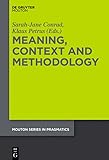Meaning, Context and Methodology / ed. by Sarah-Jane Conrad, Klaus Petrus.
Material type: TextSeries: Mouton Series in Pragmatics [MSP] ; 19Publisher: Berlin ; Boston : De Gruyter Mouton, [2017]Copyright date: ©2017Description: 1 online resource (VI, 231 p.)Content type:
TextSeries: Mouton Series in Pragmatics [MSP] ; 19Publisher: Berlin ; Boston : De Gruyter Mouton, [2017]Copyright date: ©2017Description: 1 online resource (VI, 231 p.)Content type: - 9781501512179
- 9781501504235
- 9781501504327
- 401/.43 23
- P325.5.C65 M43 2017eb
- online - DeGruyter
- Issued also in print.
| Item type | Current library | Call number | URL | Status | Notes | Barcode | |
|---|---|---|---|---|---|---|---|
 eBook
eBook
|
Biblioteca "Angelicum" Pont. Univ. S.Tommaso d'Aquino Nuvola online | online - DeGruyter (Browse shelf(Opens below)) | Online access | Not for loan (Accesso limitato) | Accesso per gli utenti autorizzati / Access for authorized users | (dgr)9781501504327 |
Frontmatter -- Contents -- Introduction -- Part 1: The contextual turn and the case for reference, truth-conditions and meaning -- Open texture and schematicity as arguments for non-referential semantics -- Full but not saturated: The myth of mandatory primary pragmatic processes -- How to get lost in context: Searle on context, content and literal meaning -- Meaning and interpretation -- The role of context in semantics: A Relevance Theory perspective -- Part 2: The contextual turn and the case for language use -- Boo semantics: Radical nonfactualism and non truth-conditional meaning -- Metaphor and mercurial content -- Part 3: The contextual turn and the case of analysis -- Context, two-dimensional semantics and conceptual analysis -- The use of the Binding Argument in the debate about location -- Slices of meaning: Levels of analysis and the unity of understanding -- Contributors -- Index
restricted access online access with authorization star
http://purl.org/coar/access_right/c_16ec
What methodological impact does Contextualism have on the philosophy of language? This collection sets out to provide some answers. The authors in this volume question three ultimately connected assumptions of the philosophy of language. The first assumption relates to the predominant status of referential semantics and its power to explain truth-conditional meaning. This assumption has come under attack by the context thesis and a number of papers pursue the question of whether this is justified. The second assumption gives priority to assertive sentences when considering language use. The context thesis changes our understanding of language use altogether; possible implications from this methodological shift are addressed in this volume. According to the third assumption, philosophical analysis amounts to nothing more than conceptual analysis. The context thesis risks undermining this project. Whether conceptual analysis can still be defended as a methodological tool is discussed in this volume.
Issued also in print.
Mode of access: Internet via World Wide Web.
In English.
Description based on online resource; title from PDF title page (publisher's Web site, viewed 25. Jun 2024)


